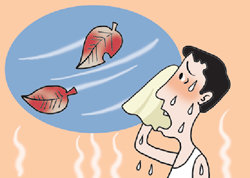This heat wave too shall pass
This heat wave too shall pass
Posted August. 17, 2019 07:29,
Updated August. 17, 2019 07:29

The recent sweltering heat, although temporarily subsided by three typhoons, does not seem to cool down soon. It may sound a bit thoughtless to say fall has come in this hot weather, but it is indeed fall now according to seasonal divisions in the lunar calendar. The “Ipchu,” the start of fall, passed last week and the “Cheoseo,” the end of heat, is coming next week, meaning that we are already entering into fall.
Ancient people calculated dates by observing the moon, which changes its shape each night on a regular cycle. This method of counting dates gave rise to the lunar calendar. The lunar calendar makes it easier to track dates but gets off the track with seasons as seasons are determined by the movement of the sun. So people divided the sun’s movement into 24 to mark the change of seasons. This is called the 24 solar terms, which are mostly in sync with the solar calendar.
The 24 solar terms were introduced to notice the change of seasons but are different from the actual weather we feel. The 24 solar terms cannot fully reflect the seasonal changes in the Korean Peninsula since they are based on the weather in the Yellow River region during the Zhou dynasty. Furthermore, the 24 solar terms do not match the current weather because of global warming. In climatology, it is considered fall when the daily mean temperature is below 20 degrees Celsius. But the beginning of fall is about 15 days later now than in the 1970s. That is why the “Ipchu,” the beginning of fall, has become the hottest day of the year now. Normally, the temperature falls down between “Ipchu” and “Cheoseo” but there is little difference of temperature between “Ipchu” and “Cheoseo” now even though they are 15 days apart.
To our ancestors, the 24 solar terms are the fruit of wisdom coming from their rich experience. They would sow seeds on “Mangjong” and harvest on “Sanggang.” Although the impacts of global warming have weakened the system’s prestige, our ancestors’ wisdom of thousands of years still shines brightly. The “Ipchu” being the hottest day of the year is similar to the shape of the taegeuk pattern, where yin starts when yang is at its extreme. A cause of collapse is born when pleasure reaches its climax and hope surges when one falls into an abyss of despair. Fall comes no matter how slow it is. This painful heat wave too shall pass.
tjdrud0306@donga.com







